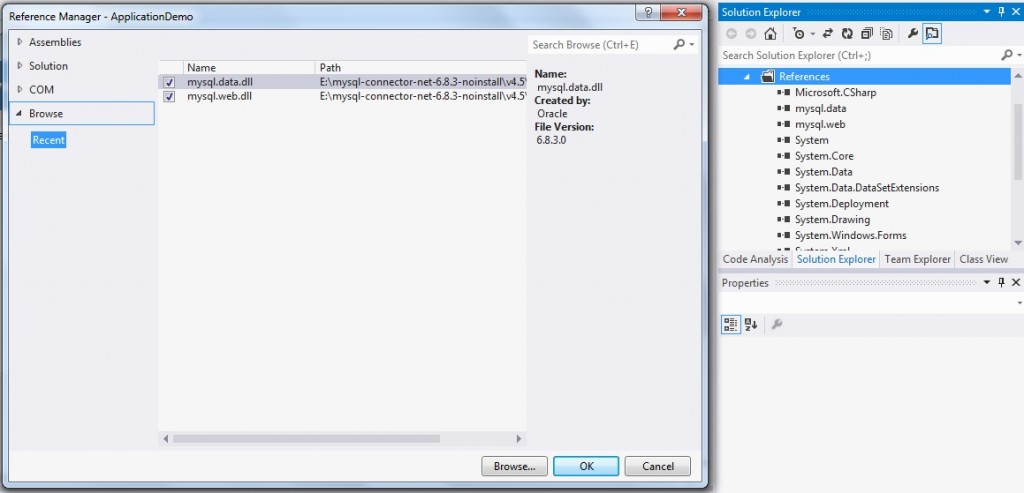Mysql Static Dll

Note This change has the following implication: Previously, Connector/C 6.1, while not officially supported on Windows XP or Windows Server 2003, could be used on those platforms. This is no longer possible. (Bug #17332056) • Static libraries built with VS2008, VS2010, VS2012 are now distributed as part of Connector/C packages for Windows: ZIP and MSI. New directories named vs9, vs10, and vs11 located under the lib directory contain static libraries and corresponding pdb files built with VS2008, VS2010, and VS2012, respectively.
AccessLib: If your DB Access Module for MySQL is compiled as a DLL or shared library, provide. If you are using a static library, supply the string ' MYSQL '. Connector/C++ is available as a dynamic or static library to use with your. To use a dynamic library file (.dll extension), link your application with a.lib import.
• MySQL now supports the use of protocol trace plugins: client-side plugins that implement tracing of communication between a client and the server that takes place using the client/server protocol. Protocol trace plugins use the client plugin API. In MySQL source distributions, a test protocol trace plugin is implemented in the test_trace_plugin.cc file in the libmysql directory. This can be examined as a guide to writing other protocol trace plugins. For more information, see; in particular,.
• The CLIENT_CONNECT_WITH_DB flag was improperly handled in the C client library. This could lead to a malformed packet sent to the server. Assistir filme saga crepusculo amanhecer parte 2 dublado completo gratis. (Bug #17351732) • The C API function could leak memory if it failed. (Bug #17337684) • The C API function could leak memory if called more than once with the MYSQL_SET_CLIENT_IP option. (Bug #17297012) • The Connector/C RPM package was missing the following files: INFO_SRC, INFO_BIN, my_print_defaults, perror.
(Bug #17261610) • The Connector/C MSI package was missing the following files: ChangeLog, README, LICENSE, COPYING, INFO_SRC, INFO_BIN. (Bug #17261526) • On Windows, a MySQL client program that simply used #include could not be compiled due to missing Windows declarations in that file. The same program would compile on other platforms. (Bug #16409270) References: See also: Bug #17514554. • The libmysql.dll library was missing several symbols: my_init, mysql_client_find_plugin, mysql_client_register_plugin, mysql_load_plugin, mysql_load_plugin_v, and mysql_plugin_options. (Bug #69204, Bug #16797982).
• For applications that use X DevAPI: #include • For applications that use X DevAPI for C: #include • For applications that use the legacy JDBC API: #include #include #include Legacy code that uses Connector/C++ 1.1 has #include directives of this form: #include #include #include To build such code with Connector/C++ 8.0 without modifying it, add $MYSQL_CPPCONN_DIR/include/jdbc to the include path. To compile code that you intend to link statically against Connector/C++, define a macro that adjusts API declarations in the header files for usage with the static library.
For details, see. • libmysqlcppconn.so.7 (Unix) • libmysqlcppconn.7.dylib (macOS) • mysqlcppconn-7-vs NN.dll, with import library vs NN/mysqlcppconn-static.lib (Windows) On Windows, the vs NN value in library names depends on the MSVC compiler version used to build the libraries (for example, vs14 for MSVC 2015). This convention enables using libraries built with different versions of MSVC on the same system. For details, see. To build code that uses X DevAPI or X DevAPI for C, add -lmysqlcppconn8 to the linker options. To build code that uses the legacy JDBC API, add -lmysqlcppconn.
You must also indicate whether to use the 64-bit or 32-bit libraries by specifying the appropriate library directory. Use an -L linker option to specify $MYSQL_CONCPP_DIR/lib64 (64-bit libraries) or $MYSQL_CONCPP_DIR/lib (32-bit libraries), where $MYSQL_CPPCONN_DIR is the Connector/C++ installation location. Note The resulting code, even though it is compiled as plain C, depends on the C++ runtime (typically libstdc++, though this may differ depending on platform or build tools; see ). To build a plain C++ application that uses the legacy JDBC API, has sources in app.c, and links dynamically to the connector library, the Makefile might look like this: MYSQL_CONCPP_DIR= Connector/C++ installation location CPPFLAGS = -I $(MYSQL_CONCPP_DIR)/include -L $(MYSQL_CONCPP_DIR)/lib64 LDLIBS = -lmysqlcppconn app: app.c The library option in this case is -lmysqlcppcon, rather than -lmysqlcppcon8 as for an X DevAPI or X DevAPI for C application. With that Makefile, the command make app generates the following compiler invocation: cc -I./include -L./lib64 app.c -lmysqlcppconn -o app Typically, applications that use the legacy JDBC API are written in plain C++. However, if application code does use C++11, the Makefile should also specify the -std=c++11 option: CXXFLAGS = -std=c++11.
Sohraneniya dlya 3d instruktor 227 domashnyaya versiya full. • libmysqlcppconn-static.a (Unix, macOS) • vs NN/mysqlcppconn-static.lib (Windows) On Windows, the vs NN value in library names depends on the MSVC compiler version used to build the libraries (for example, vs14 for MSVC 2015). This convention enables using libraries built with different versions of MSVC on the same system. For details, see. To compile code that you intend to link statically against Connector/C++, define a macro that adjusts API declarations in the header files for usage with the static library. One way to define the macro is by passing a -D option on the compiler invocation command. • For applications that use X DevAPI or X DevAPI for C, define the STATIC_CONCPP macro.